Book contents
- Frontmatter
- Contents
- Contributors
- Introduction
- I DEFINITION, CONCEPTUALIZATION, AND MEASUREMENT ALTERNATIVES
- II SURVEY METHODS
- 4 Between Social Theory and Social Science Practice: Toward a New Approach to the Survey Measurement of “Race”
- 5 Balancing National and Ethnic Identities: The Psychology of E Pluribus Unum
- 6 Black and Blue: Black Identity and Black Solidarity in an Era of Conservative Triumph
- III CONTENT ANALYSIS AND COGNITIVE MAPPING
- IV DISCOURSE ANALYSIS AND ETHNOGRAPHY
- V EXPERIMENTS
- Bibliography
- Index
6 - Black and Blue: Black Identity and Black Solidarity in an Era of Conservative Triumph
Published online by Cambridge University Press: 05 June 2012
- Frontmatter
- Contents
- Contributors
- Introduction
- I DEFINITION, CONCEPTUALIZATION, AND MEASUREMENT ALTERNATIVES
- II SURVEY METHODS
- 4 Between Social Theory and Social Science Practice: Toward a New Approach to the Survey Measurement of “Race”
- 5 Balancing National and Ethnic Identities: The Psychology of E Pluribus Unum
- 6 Black and Blue: Black Identity and Black Solidarity in an Era of Conservative Triumph
- III CONTENT ANALYSIS AND COGNITIVE MAPPING
- IV DISCOURSE ANALYSIS AND ETHNOGRAPHY
- V EXPERIMENTS
- Bibliography
- Index
Summary
We believe it is the duty of the Americans of Negro descent, as a body, to maintain their race identity until this mission of the Negro people is accomplished, and the ideal of human brotherhood has become a practical possibility.
– W. E. B. Du Bois. “The Conservation of the Races,” 1897Say it loud, I'm Black and I'm proud!
– The Temptations, “Message from a Black Man,” circa 1970The concept of racial identity – and, particularly in the United States, black racial identity – is ubiquitous in scholarly work on race in the social sciences and the humanities as well as in everyday political discourse. Several social scientists, however, have generally questioned the utility of the concept of “identity,” racial or otherwise, for social analysis. Scholars such as Rogers Brubaker and Frederick Cooper argue that the concept is used to capture a variety of confusing and sometimes contradictory clusters of meanings. They would have social scientists abandon the term for a range of more precise terms. Some philosophers have also questioned the analytical, moral, and political utility of both the general concept of identity and the more specific concept of black identity. Scholars such as Tommie Shelby, for example, call for the abandonment of the notion of a “collective black identity” in order to place the project of building philosophically liberal and politically progressive black solidarity on stronger philosophical, political, and moral grounds.
- Type
- Chapter
- Information
- Measuring IdentityA Guide for Social Scientists, pp. 175 - 200Publisher: Cambridge University PressPrint publication year: 2009
- 5
- Cited by



